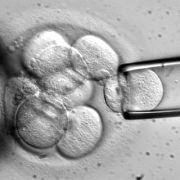Researchers Reevaluate Thinking on Role of Specific Proteins in Testosterone Production
Study results could help lead to better treatments for hypogonadism and other steroid hormone disorders.

According to a news release from The Endocrine Society, a study recently published in Endocrinology “refutes the scientific community’s long-held belief that the body needs a specific protein to produce steroid hormones like testosterone.”
Lead study author Vimal Selvaraj, PhD, of Cornell University in Ithaca, NY, said that for many years, “the prevailing view in the scientific community has been that a protein called the translocator protein (TSPO) was an essential part of steroid hormone biosynthesis.” But this study turns this thinking on its head because it “definitively demonstrated that a deficiency of this protein did not affect testosterone production in male mice.”
This is a potentially important development because, according to The Endocrine Society, “Researchers want to understand exactly how the body produces these hormones in order to develop better treatments for steroid hormone disorders such as hypogonadism and congenital adrenal hyperplasia.”
In order to “explore in more detail the function of TSPO in cell type-specific experimental manipulations in vivo,” the authors of “Translocator Protein/Peripheral Benzodiazepine Receptor Is Not Required for Steroid Hormone Biosynthesis,” published in Endocrinology, cultivated a breed of mice “with TSPO deletion in testicular Leydig cells” (which produce testosterone).
They reported that “Genetic ablation of TSPO in steroidogenic Leydig cells in mice did not affect testosterone production, gametogenesis, and reproduction.” In other words, the cells produced normal levels of testosterone, allowing the mice to reproduce.
The authors also reported that expression of steroidogenic acute regulatory protein, cytochrome P450 side chain cleavage enzyme, 3β-hydroxysteroid dehydrogenase/Δ5-Δ4 isomerase type I, and TSPO2 in TSPOcΔ/Δ testis was also unaffected.
They wrote that “these results challenge the prevailing dogma that claims an essential role for TSPO in steroid hormone biosynthesis and force reexamination of functional interpretations made for this protein. This is the first study examining conditional TSPO gene deletion in mice. The results show that TSPO function is not essential for steroid hormone biosynthesis.”
Selvaraj said this study “rectifies a huge misconception in the field, “ and will force scientists “to reexamine conclusions drawn from numerous peer-reviewed studies of steroid hormone biosynthesis. Down the line, our improved understanding of biosynthesis mechanisms will lead to improved diagnoses and treatments for steroid hormone production disorders.”